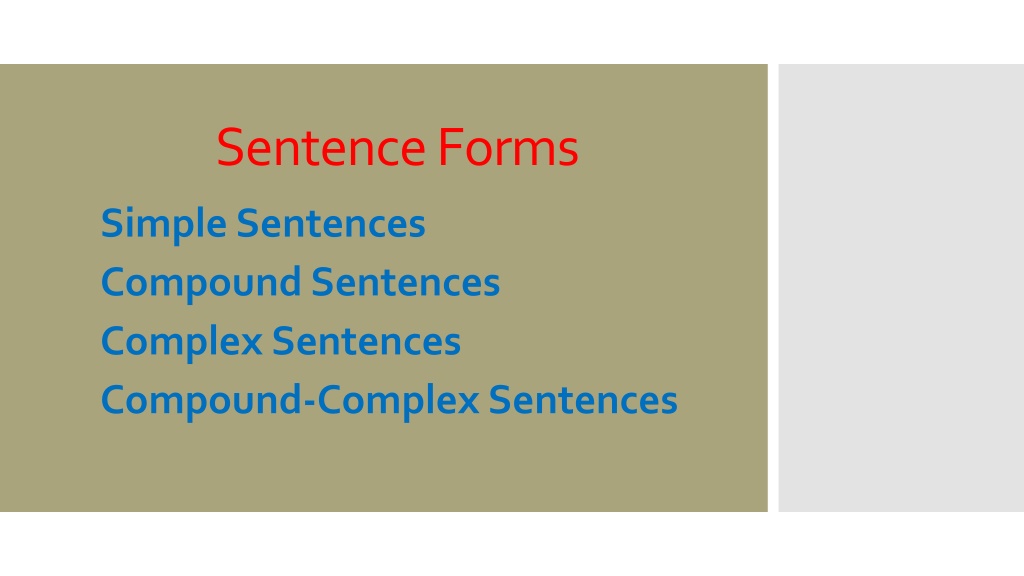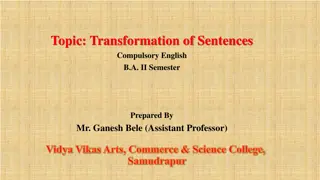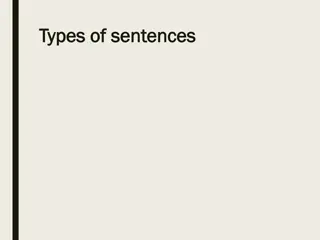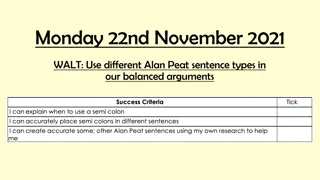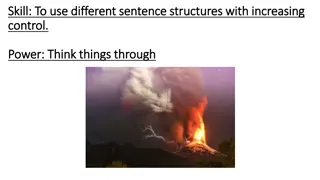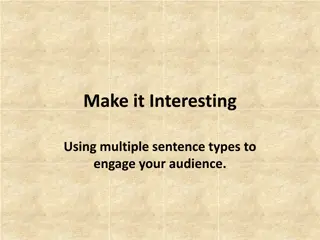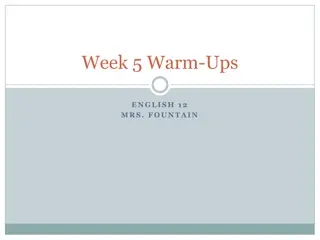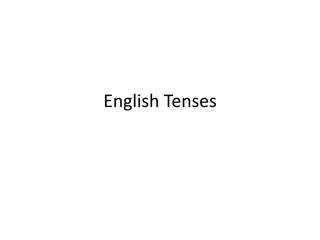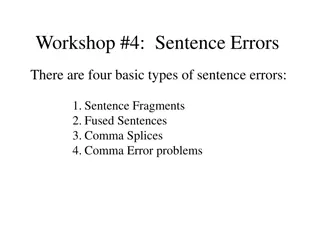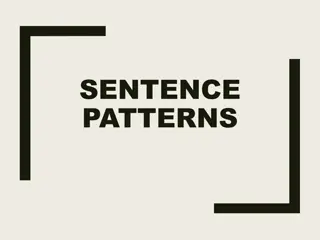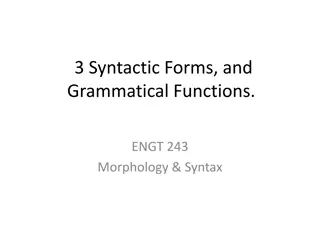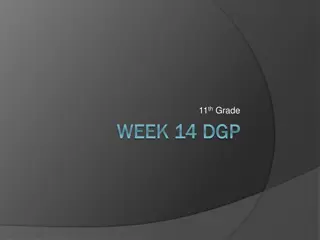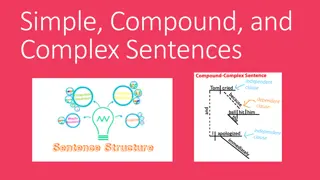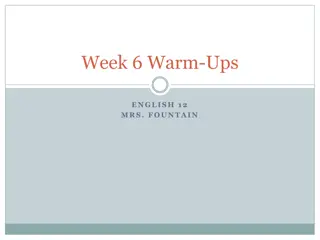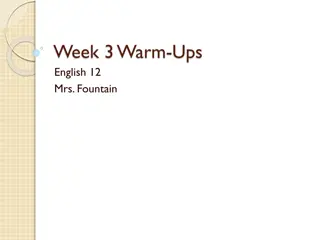Understanding Sentence Forms and Structures
Explore the various types of sentences, from simple to compound-complex, and learn how to identify subjects, predicates, conjunctions, and clauses within them. Enhance your knowledge of sentence construction and expand your writing skills with practical examples provided.
Download Presentation

Please find below an Image/Link to download the presentation.
The content on the website is provided AS IS for your information and personal use only. It may not be sold, licensed, or shared on other websites without obtaining consent from the author. Download presentation by click this link. If you encounter any issues during the download, it is possible that the publisher has removed the file from their server.
E N D
Presentation Transcript
Sentence Forms Simple Sentences Compound Sentences Complex Sentences Compound-Complex Sentences
A.) Some students like to study in the mornings. B.) Sydney and Lauren play soccer in the afternoons. C.) Shelly goes to the library and studies every day. Also called an Independent Clause contains a Subject and a Predicate (Verb) and it Expresses a Complete Thought
1.) Megan and DeAnne auditioned for the 1.) Megan and DeAnne auditioned for the lead role in the musical. lead role in the musical. 2.) 2.) The kittens were adopted by the family. The kittens were adopted by the family. 3.) 3.) Peanut butter and grape jelly sandwiches Peanut butter and grape jelly sandwiches are Jaime s favorite. are Jaime s favorite. 4.) 4.) StuCo decorated the cafeteria for the StuCo decorated the cafeteria for the Homecoming Dance. Homecoming Dance. 5.) The surprise party was organized by 5.) The surprise party was organized by Kathy s two best friends. Kathy s two best friends. Identify the Subject and Predicate (Verb) in these Simple Sentences:
*Contains 2 independent clauses *Contains 2 independent clauses (simple sentences) joined by a (simple sentences) joined by a coordinating conjunction. coordinating conjunction. *The conjunctions are as follows: *The conjunctions are as follows: for, and, nor, but, or, yet, so. for, and, nor, but, or, yet, so. (Helpful Hint: (Helpful Hint: The first letter of each The first letter of each conjunction spells FANBOYS) conjunction spells FANBOYS) * *T These conjunctions are always hese conjunctions are always preceded by a comma. preceded by a comma.
1.) I am going to the dance, so I have to buy a new dress. 2.) Jerry took the pictures, and Alicia developed them. 3.) New York is on the East Coast, and California is on the West Coast. 4.) Seth walked into the crowded room, but I couldn t find him. 5.) Is the party on Friday, or is it on Saturday? Identify the conjunction in these COMPOUND sentences:
*Has an intendent clause joined by a dependent clause/subordinate clause. -Dependent clauses do NOT express a complete thought and can t stand alone as sentences. -A dependent clause begins with a subordinating conjunction: Because, since, after, although, if, when, etc. *Follow these formats when writing complex sentences: --DEPENDENT CLAUSE, INDEPENDENT CLAUSE Because I have no milk, I ll go to the store. --INDEPENDENT CLAUSE, DEPENDENT CLAUSE I ll go to the store because I have no milk.
Examples: 1.) When he handed in his homework, he forgot to hand the teacher the last page. 2.) The teacher returned the homework after she noticed the error. 3.) The students are studying because they have a test tomorrow. (HINT: You really do) 4.) After they finished studying, Jack and Diane went to the Tasty Freeze.
1.) Because it was raining, the game was cancelled. 2.) When I am sick, I do not go to school. 3.) He is not going because I forgot to invite him. 4.) George watched football because Sarah went shopping. 5.) If you want pizza, you need to order it now. Identify the conjunction in these COMPLEX sentences:
*Contains 2 Independent clauses (simple sentences) & 1 Dependent (Subordinate) clause. **Put a comma AFTER the dependent/subordinate clause IF it begins the sentence. ***Put a comma BEFORE the FANBOYS that connect the 2 independent clauses.
Examples: Examples: 1.) 1.) Charlie could not hear his watch Charlie could not hear his watch because it had stopped, and he was because it had stopped, and he was worried. worried. 2.) 2.) Because it had stopped, Charlie could Because it had stopped, Charlie could not hear his watch, and he was worried. not hear his watch, and he was worried. 3.) 3.) Although Mom called out for Linus, no Although Mom called out for Linus, no one answered, and Mom was scared. one answered, and Mom was scared. 4.) 4.) No one answered when Mom called out No one answered when Mom called out for Linus, and Mom was scared. for Linus, and Mom was scared.
